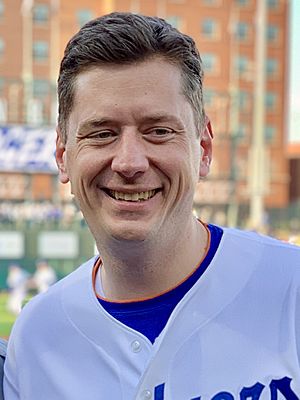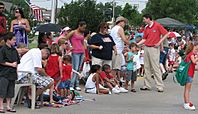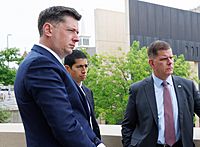David Holt (politician) facts for kids
Quick facts for kids
David Holt
|
|
|---|---|
 |
|
| 38th Mayor of Oklahoma City | |
| Assumed office April 10, 2018 |
|
| Preceded by | Mick Cornett |
| Member of the Oklahoma Senate from the 30th district |
|
| In office November 16, 2010 – April 10, 2018 |
|
| Preceded by | Glenn Coffee |
| Succeeded by | Julia Kirt |
| Personal details | |
| Born | March 10, 1979 Oklahoma City, Oklahoma, U.S. |
| Nationality | American Osage Nation |
| Political party | Republican |
| Spouse | Rachel Canuso |
| Children | 2 |
| Education | George Washington University (BA) Oklahoma City University (JD) |
David Holt (born March 10, 1979) is an American attorney, businessman and Republican politician who is the 38th mayor of Oklahoma City and dean of the Oklahoma City University School of Law. He is a member of the Osage Nation. He served in the Oklahoma Senate from 2010 to 2018, eventually as majority whip.
Holt was elected mayor on February 13, 2018, and sworn in on April 10. He was reelected on February 8, 2022. He is the youngest mayor of Oklahoma City since 1923; during his first year in office, he was the youngest mayor of a U.S. city over 500,000. He is Oklahoma City's first Native American mayor.
As mayor, Holt presided over the passage of MAPS 4 in 2019, a $1.1 billion initiative including 16 projects. In 2023, the City Council and ultimately the city's voters approved Holt's proposal to put at least $850 million of taxpayer money toward building a new $900 million arena, in return for an agreement by the Oklahoma City Thunder to play in the new arena for 25 years.
Contents
Early life and education
Holt was born and raised in northwest Oklahoma City, with family roots in Pittsburg County, Oklahoma. He is Osage through his mother, Mary Ann Fuller Holt, who inspired him to public service. He was also inspired by his maternal grandfather, Leonard Fuller, a World War II veteran and career Army officer who directed the Model Cities Program in McAlester, Oklahoma, after his retirement from the military.
After graduating from Putnam City North High School in Oklahoma City, Holt earned a B.A. from George Washington University, which his mother attended. He was a sports editor for The GW Hatchet.
Holt returned to Oklahoma, where he earned a Juris Doctor from Oklahoma City University and established a legal practice. In 2014, he was named director of investor relations for Hall Capital. He has also served as an adjunct professor at Oklahoma City University.
Early political career
Holt became active in the Republican Party, serving as an aide to Dennis Hastert when Hastert was Speaker of the House, and during the 9/11 attacks. He served in the White House Office of Legislative Affairs under President George W. Bush.
In 2004, Holt returned full-time to Oklahoma, where he served as the state's campaign coordinator to reelect Bush. He served U.S. Senator Jim Inhofe and Lt. Governor Mary Fallin. In 2006 he was appointed chief of staff to Oklahoma City Mayor Mick Cornett, where he served until his election to the State Senate. Holt was Cornett's chief of staff when Oklahoma City successfully lobbied to attract a major league basketball team, gaining what is now known as the Oklahoma City Thunder of the National Basketball Association.
Oklahoma State senate

Holt was elected to the State Senate on July 27, 2010, taking 64% of the vote in the Republican primary and running unopposed in the general election. He took office on November 16, 2010. He succeeded Glenn Coffee, the first Republican Senate president pro tempore in Oklahoma history.
In the State Senate, Holt worked on tax issues, aiming to eliminate or reduce income tax. He served as a Republican member of the Electoral College in 2012. In his first term, he was elected Majority Caucus Vice Chair, and for the 2013-14 legislative sessions, Holt was elected majority whip for the Senate Republican caucus. He was also named vice chair of the new Appropriations Subcommittee on Select Agencies.
For the 2015 and 2016 sessions, Holt was named chairman of the Appropriations Subcommittee on Select Agencies. He served as campaign chair in Oklahoma for Marco Rubio's presidential campaign in 2015 and 2016. In 2015, Holt worked on election reform, authoring a law that created an online registration system. In 2016, Holt authored a law that created a "revenue stabilization fund" intended to minimize the effect of future revenue shortfalls. ..... Holt did not participate in the vote on final passage and the bill was vetoed.
In the State Senate in 2017 and 2018, Holt worked on increasing teacher pay. In the 2017 and 2018 sessions, Holt was named Appropriations Subcommittee Chair for Public Safety and Judiciary.
Mayor of Oklahoma City
First term
In 2017, he announced his candidacy for mayor of Oklahoma City.
Holt was elected mayor on February 13, 2018, defeating Taylor Neighbors and Randall Smith in a nonpartisan race. Holt was sworn in as mayor on April 10. He resigned from the state senate before taking office. At the time of his swearing-in, Holt was 39 years and one month old, making him Oklahoma City's youngest mayor since 1923 and the youngest mayor of a U.S. city over 500,000, as well as Oklahoma City's first Native American mayor. In 2019, Holt and city leaders opened the city's new streetcar system, a project funded by MAPS 3.
Holt's second year in office brought the development and passage of MAPS 4, a $1.1 billion initiative to address 16 priorities. The Oklahoman called Holt "the architect" of the "most ambitious MAPS ever". The initiative received 71.7% of the vote on December 10, 2019, a modern record for a sales tax vote in Oklahoma City. MAPS 4 includes funding for a variety of city priorities.
In 2019, Holt was elected to the leadership of the United States Conference of Mayors and named vice-chair of the International Affairs Committee. In 2020, he was elected a trustee of the United States Conference of Mayors and to the board of the National League of Cities. As mayor, Holt has emphasized diversity and community inclusion. In 2019, he joined leaders of five other cities in signing an agreement to form Oklahoma's first Regional Transit Authority (RTA), with plans to build a metropolitan rail system in the years ahead.
Holt proclaimed "Indigenous Peoples' Day" for the first time in city history, proclaimed "Pride" for the first time in city history to honor the LGBTQ community, and stated publicly that immigrants are welcome in Oklahoma City. Holt has joined official celebrations commemorating the city's civil rights movement and included a $26 million civil rights center in the MAPS 4 initiative. The city also added a diversity and inclusion officer to the city staff.
During the COVID-19 pandemic, Holt proclaimed a state of emergency on the first day a local case was identified in March 2020, put Oklahoma City into "shelter in place", and was continuously aggressive in addressing the pandemic. When Oklahoma City experienced a second peak in the summer of 2020, Holt supported a mask ordinance. Eleven months into the pandemic, Oklahoma City had a death rate lower than all but six other large cities, and 27% lower than the rest of Oklahoma.
During the 2020 protests following the murder of George Floyd in Minneapolis, Holt attended protests. He met with Black Lives Matter leaders and created a task force to look at law enforcement policies and a task force to look at reinstatement of the city's Human Rights Commission. On April 19, 2020, the 25th anniversary of the Oklahoma City bombing, Holt spoke at the ceremony. In March 2021, he opened a $288 million convention center. In May 2021, Holt authored and passed legislation to repeal 85% of Oklahoma City's occupational licenses. In July 2021, he and other Oklahoma City leaders announced their support for the expansion of Tinker Air Force Base, Oklahoma City's largest employer. In September 2021, Holt and tribal leaders opened the new First Americans Museum, a $175 million facility dedicated to telling the Native American story. Holt spoke at the opening ceremony as the city's first Native American mayor.
In June 2021, a publicly released poll of Oklahoma City voters found that Holt was favored by Republicans 54%-19% and by Democrats 61%-12%. The pollster wrote, "In today's political environment, it is very unusual to see a candidate who is able to draw such support from members of both parties." In April 2022, Holt led a delegation of 12 mayors to Israel, where they met with various officials, including the mayors of Tel Aviv and Jerusalem.
Second term
Holt was reelected to a second term on February 8, 2022, receiving 59.8% of the vote in four-way, nonpartisan race, 40 points ahead of his nearest competitor. The election featured the largest voter turnout for an Oklahoma City mayoral election since 1959, and Holt received more votes than any candidate for Oklahoma City mayor since 1959.
Holt's second term began in May 2022. The next month, Holt broke ground on the city's first Bus Rapid Transit line, a 9.5 mile, $28.9 million transit project. In July 2022, the Oklahoma City Council recreated a Human Rights Commission, which it had lacked since 1996. Adoption resulted from a task force Holt created in the summer of 2020. The new Human Rights Commission passed 5–4, with Holt casting one of the five affirmative votes.
In November 2022, Holt supported a bond issue for public education, a nearly $1 billion proposal for school infrastructure. The two ballot questions each received over 60% approval from voters. In May, it was announced Holt would serve as dean of the Oklahoma City University School of Law starting July 1, 2023, while also remaining mayor. In June 2023, Holt was elected president of the United States Conference of Mayors for 2025–2026. In August 2023, Holt spoke on the steps of the Lincoln Memorial at the 60th anniversary of the March on Washington.
In September 2023, Holt announced a plan to publicly fund a new arena in downtown Oklahoma City in exchange for a commitment from the Oklahoma City Thunder to stay in Oklahoma City beyond 2050. A supporter of the arena proposal, Holt said the team would leave Oklahoma City without a new arena. Under the agreement, taxpayers would pay at least $850 million of the cost of the arena while the team, valued at $3 billion, would pay $50 million. The proposal led to wide public debate. Holt and other proponents of the proposal argued that the team's presence in Oklahoma City was worth $580 million per year to Oklahoma City's economy, while economists who specialize in the study of stadium subsidies strongly criticized the deal and were skeptical of its purported benefits. In a December 2023 referendum, 71% of Oklahoma City voters approved a six-year sales tax to fund the arena.
Opposition to Trumpism
As a Republican, Holt has opposed Trumpism.
Personal life
Holt is married to Rachel Canuso, and they have two children. They are Episcopalian.
Holt wrote Big League City: Oklahoma City's Rise to the NBA (2012), a nonfiction political and sports book published by Full Circle Press. It details the arrival of major league sports in Oklahoma City, culminating with the 2008 relocation there of the National Basketball Association's Seattle SuperSonics, which was renamed the Oklahoma City Thunder. Holt served as chief of staff to Oklahoma City Mayor Mick Cornett at the time.
Electoral history
| 2010 Oklahoma State Senate District 30 election | |||||
|---|---|---|---|---|---|
| Party | Candidate | Votes | % | ±% | |
| Republican | David Holt | 5,125 | 63.59% | ||
| Republican | Matt Jackson | 2,934 | 36.41% | ||
| Turnout | 8,059 | ||||
In 2014, Holt was reelected to a second term in the Oklahoma Senate without opposition and no election was held.
| 2018 Oklahoma City nonpartisan mayoral election | |||||
|---|---|---|---|---|---|
| Party | Candidate | Votes | % | ±% | |
| Nonpartisan politician | David Holt | 20,409 | 78.5% | ||
| Nonpartisan politician | Taylor Neighbors | 3,443 | 13.2% | ||
| Nonpartisan politician | Randall Smith | 2,138 | 8.2% | ||
| Turnout | 25,990 | ||||
| 2022 Oklahoma City nonpartisan mayoral election | |||||
|---|---|---|---|---|---|
| Party | Candidate | Votes | % | ±% | |
| Nonpartisan politician | David Holt | 36,338 | 59.8 | ||
| Nonpartisan politician | Frank Urbanic | 12,111 | 19.9 | ||
| Nonpartisan politician | Carol Hefner | 8,285 | 13.6 | ||
| Nonpartisan politician | Jimmy Lawson | 4,022 | 6.6 | ||
| Turnout | 60,756 | ||||
See also
- List of mayors of the 50 largest cities in the United States


